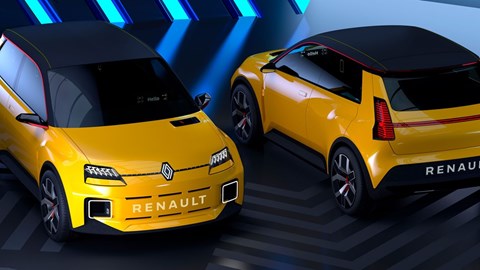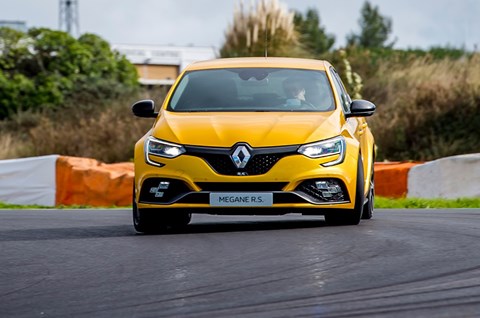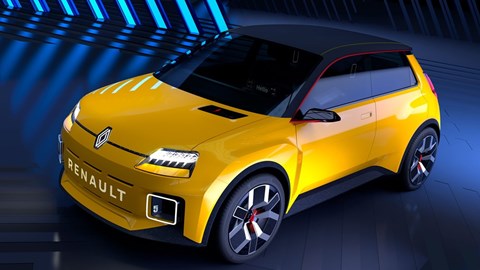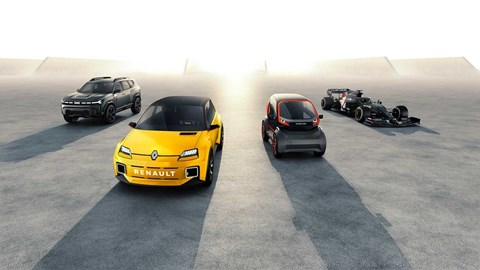► Chief executive explains the thinking behind his ambitious company overhaul
► Relives the ‘eureka!’ moment when the new electric 5 was born
► Says Britain’s combustion ban is helping push forward the switch to EV
The new 5 nearly didn’t happen
‘It was one day after I came here [as CEO last July].There was some kind of garage into the design centre. I saw an orange car which looked like a Renault 5 and I said to the guys that’s what we have to do. We tried to put the design on the CMF-EV [new modular electric] platform, and you could see that the package would fit, so that’s what we decided to do.
‘Sometimes there’s no big strategy, it’s from the guts. Especially in the UK, everybody [on social media] was immediately reconnected with the Renault 5 – that’s the kind of product they want from us. Sometimes it happens like this.’

The mistake the new Renault 5 must avoid
‘When I went to VW [in 2009], there was a time when they were launching the third-generation Beetle. I saw that car like an iconic product that everybody knew. It worked for a few years in the US but it never really worked in Europe. You know why? Because the new car was far away from the original concept, as much as the Cinquecento [de Meo had previously been heavily involved in the launch of the Fiat 500] was very close, relatively speaking, to the original concept of being an emotional small car, relatively affordable. The third-generation Beetle had nothing to do with the original one.
‘I learned my lesson. If you want to stay consistent with the original position of the Renault 5 you need to do something that fits the original concept. It was a democratic product, it was a popular product.’
Renault needs some bigger cars
‘We must lower the costs, focus on value, try to avoid the historical dependence for Renault on the small-car segment. It’s like building a business on one leg. When I was at Renault in the ’90s Renault was very successful with cars like the Clio and Twingo, but they were also able to bring in the Megane family, strengthening their positiion in the C-segment, and the company was on two legs, it was very successful.
‘You can announce a plan. The important thing is to do it.’

Britain’s ICE ban is forcing the pace
‘It’s a pretty bold statement that shows a bold ambition. These kind of changes in technology sometimes are pushed by regulation. We will see in 20 years whether this is a good thing or not. There are a lot of uncertainties. It’s coming because of regulation.
‘Maybe we have a possibility in the UK to push the envelope and to be quicker in the energy transition. That’s a discussion we are having. We have the platforms for that, we have the base.
‘The mission of that car [the new 5] goes beyond Renault. The mission of that project is to democratise electric technology in Europe, and you do that when you are able to do a competitive electric car in the range between 20,000 and 30,000 euros. Making money, obviously. We want to make it simple, accessible.

‘Combustion-engined cars still have a long life. I’m asking myself what to do with the next-generation Clio, what kind of concept it needs to be. We still have a little bit of time and some technical options.
‘Maybe there will be other markets where combustion-engined B-segment cars will be very successful, but maybe not in Europe. It’s difficult right now to read the market.
‘The Dacia Sandero is the most sold car in the retail market in Europe, and it’s a combustion-engined car.’
Renault isn’t just another car maker
‘These times are very complicated, especially for car manufacturers, and especially for Renault, which has not really been performing properly in the last years.
‘One of the responsibilities of business leaders is to protect people’s jobs, especially in these times, and especially in a company like Renault that has always been a little bit like a social laboratory – a lot of innovation in terms of social relationships in this country happened in this company. I think we need to be true to our history.

‘I will have to make tough decisions, but there’s no point scaring to hell everybody by announcing that I’m going to close a plant there. We will do it [if necessary], but we will do it in the full respect of people’s future and employment.
‘There’s discussion of whether we should produce an A-segment car in France or a B-segment car, but the thing has gone. We have Morocco, Turkey, Romania… they are more competitive. I push France on the upper part. The Germans are doing the same – they use Eastern Europe to produce more competitive cars and they kept the premium and technological part in Germany. It’s a smart strategy.
‘If we compare with PSA, in 2014 they had to close the Aulnay plant – it was a big deal here [in France]. Still they have the scars. But they also did a lot of right-sizing, which we didn’t, for whatever reason. If you want to have a competitive industrial-technological footprint in our domestic market, we have to do a quality job, we have to look at the future.’